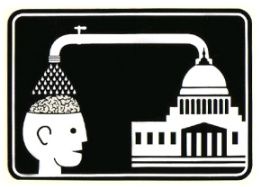John Young was one of the co-founders of Wikileaks. He quickly left the organization in disagreement with some of its policies (CNET). Young was a natural choice for Wikileaks since he's operated a leak website, CRYPTOME, since 1996. His site just released two articles on July 31 attributed to Wikileaks' Julian Assange (me@i.1.org). The announcement read:
"These essays on conspiracies by Julian Assange (me@iq.org) were retrieved today from his website iq.org. The first from the currently active site, dated November 10, 2006, and the second at archive.org, dated December 3, 2006." CRYPTOME - 31 July 2010 (author's emphasis)
The essay titles indicate an entirely different take on conspiracies than that indicated by Assange in his 9/11 comments. In fact, in these two essays from 2006, Assange defines conspiracies as the critical state function to maintain power. The titles are:
State and Terrorist Conspiracies me @ iq.org November 10, 2006
Conspiracy as Governance me @ iq.org December 3, 2006
In the second essay, Conspiracy as Governance, Assange outlines the centrality of conspiracies to maintaining elites. ![]()
"Conspiracy as governance in authoritarian regimes
"Where details are known as to the inner workings of authoritarian regimes, we see conspiratorial interactions among the political elite, not merely for preferment or favor within the regime, but as the primary planning methodology behind maintaining or strengthening authoritarian power.
"Authoritarian regimes create forces which oppose them by pushing against a people's will to truth, love and self-realization. Plans which assist authoritarian rule, once discovered, induce further resistance. Hence such schemes are concealed by successful authoritarian powers until resistance is futile or outweighed by the efficiencies of naked power. This collaborative secrecy, working to the detriment of a population, is enough to define their behavior as conspiratorial." Julian Assange, Dec. 3, 2006
Assange proceeds to define conspiracies as "cognitive devices" that are able to "out think the same group of individuals acting alone." He argues that "deceiving conspiracies" operate by distorting reality to achieve some specific goal. The outcome is of these conspiracies is likely to be "misplaced. Programmers call this effect garbage in, garbage out."
After defining the dangers and centrality of government conspiracies in the first and second essay, Assange proposes the following:
"Attacks on conspiratorial cognitive ability.
"A man in chains knows he should have acted sooner for his ability to influence the actions of the state is near its end. To deal with powerful conspiratorial actions we must think ahead and attack the process that leads to them since the actions themselves can not be dealt with. We can deceive or blind a conspiracy by distorting or restricting the information available to it." Julian Assange, Dec. 3, 2006
"Distorting or restricting the information available" to conspiracies is the justification for dis-intermediating the flow of information, as Wikileaks has done in the past. Gather raw data and simply post it. The strategy most recently with the Afghanistan leaks involved choosing three mainstream media news organizations as intermediaries - The New York Times, the Guardian, and Der Spiegel.
(Note: You can view every article as one long page if you sign up as an Advocate Member, or higher).





